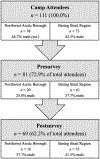A Pilot Evaluation of Culture Camps to Increase Alaska Native Youth Wellness
- PMID: 30755049
- PMCID: PMC7989548
- DOI: 10.1177/1524839918824078
A Pilot Evaluation of Culture Camps to Increase Alaska Native Youth Wellness
Abstract
Suicide is a significant health disparity among Alaska Native youth, which is linked to cultural disruptions brought about by colonialism and historical trauma. Many Indigenous suicide prevention efforts center on revitalizing and connecting youth to their culture to promote mental health and resilience. A common cultural approach to improve psychosocial outcomes is youth culture camps, but there has been little evaluation research to test this association. Here, we conduct a pilot evaluation of a 5-day culture camp developed in two remote regions of Alaska. The camps bring together Alaska Native youth from villages in these regions to take part in subsistence activities, develop new relationships, develop life skills, and learn traditional knowledge and values. This pilot evaluation of the culture camps uses a quantitative pre/post design to examine the outcomes of self-esteem, emotional states, belongingness, mattering to others, and coping skills among participants. Results indicate that culture camps can significantly increase positive mood, feelings of belongingness, and perceived coping of participants. Culture camps are a common suicide prevention effort in Indigenous circumpolar communities, and although limited in scope and design, this pilot evaluation offers some evidence to support culture camps as a health promotion intervention that can reduce suicide risk.
Keywords: Alaska Native youth; Indigenous youth; culture; culture camps; protective factors; psychosocial outcomes; rural; suicide prevention; wellness.
Figures
References
-
- Alaska Department of Health and Human Services. (2016). Health indicator report of suicide mortality rate, 5-year average, 2011-2015. Retrieved from http://ibis.dhss.alaska.gov/indicator/view/Suic1524.SEX.html
-
- Anderson-Butcher D, Cash S, Saltzburg S, Midle T, & Pace D (2004). Institutions of youth development: The significance of supportive staff-youth relationships. Journal of Human Behavior in the Social Environment, 9(1-2), 83–99. doi:10.4324/9781315044118 - DOI
-
- Bjerregaard P (2001). Rapid socio-cultural change and health in the Arctic. International Journal of Circumpolar Health, 60, 102–111. - PubMed
Publication types
MeSH terms
Grants and funding
LinkOut - more resources
Full Text Sources
Medical



